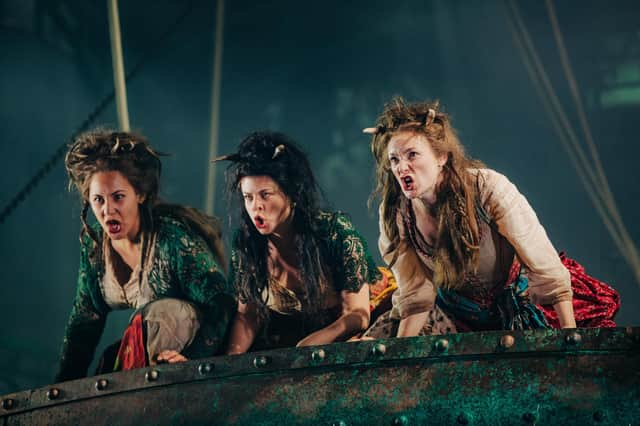Edinburgh International Festival classical & opera reviews: Rusalka | Opening Concert | Ukrainian Freedom Orchestra | Philharmonia Chamber Players


OPERA
Rusalka, Festival Theatre, Edinburgh ****
In transferring their production of Dvořák’s fairy-tale opera, Rusalka, from a specially designed, open-air opera pavilion seating 650 in the folds of the Chiltern hills, to an inner-city theatre with a capacity of almost 2,000, there were bound to be challenges for Garsington Opera in coming to Edinburgh. Musically, there is no doubt that the Philharmonia Orchestra, playing superbly under conductor Douglas Boyd, bring a generosity of life and colour to underpin what is going on above them, while a fine cast of singers led by Natalya Romaniw in the title role give authenticity to a story that’s not dissimilar to The Little Mermaid. Elements of the production, however, fare less well. In its dark green hues and more or less permanently dry-iced hazy staging, it’s as if something is missing from the overall look. From a front stalls seat, the visual impact of the water – central to the opera – was lost as it couldn’t be seen, although occasional slurpy sounds as the characters wade around are evidence it is there. While grasp of the Czech language was mixed, Romaniv was outstanding in playing Rusalka with growing intensity, pacing compelling emotion all the way to the final kiss of death. Carol Main
MUSIC
EIF Opening Concert , Usher Hall ****
What a sight. The Usher Hall stage was packed to the gunnels for this first back-to-normal Festival Opening Concert in three years, the inflated ranks of the BBC SSO enjoying the exhilaration of the occasion under Sir Donald Runnicles, and behind them the double forces of the Edinburgh Festival Chorus and vividly red-shirted, super-efficient NYCOS National Girls Choir.
Like the latter, Carl Orff’s Carmina Burana is an unadulterated, in-your-face primary colour experience, which doesn’t make it the best piece of music ever written, but its primitive energy, bawdy sentiments and carefree spirit seemed exactly right for the occasion. Time to burst open the party poppers and let the hair down. We’ve long needed an injection of something more self-indulgent than a Covid vaccination.
As such, Runnicles was the man to make it happen, his robust personality shining through a performance equally fired by the euphoric bombast of O Fortuna, the carefree swagger of Floret silva nobilis, or the lustful seduction of The Court of Love. There was that soupçon of risk, too, which he favours, instances where he drew back allowing the spontaneous to occur. It mostly did, the tumultuous, rip-roaring inevitability of the final movements the ultimate example, even if there were minor casualties en route, moments were togetherness or balance were not apparent priorities.
What a trio of soloists: the mischievous spark between soprano Meechot Marrero and baritone Thomas Lehman, Sunnyboy Dladla’s brilliantly agonising roasted swan, their theatrical interactions matched by gloriously charismatic vocal performances.
There was an equally thrilling warm-up from the SSO, Respighi’s Pines of Rome, itself an ostentatious riot of colour, the thundering organ and audience-encircling off-stage brass adding intoxication to the closing bars by providing the ultimate surround sound experience. What a sound. Ken Walton
MUSIC
Ukrainian Freedom Orchestra, Usher Hall ***
Two weeks ago, the Ukrainian Freedom Orchestra did not exist. The brainchild of conductor Keri-Lynn Wilson, it brings together Ukrainian musicians, some working outside Ukraine, some recent refugees and many still in the country permitted to lay down weapons in favour of instruments. They were in Edinburgh as part of a whistle-stop UK/US tour, as Wilson put it, “in honour of Ukrainian culture”.
The event began with a more strident political message from Ukrainian activist Zhenya Dove, who told a packed Usher Hall: “We’re fighting for freedom, and there’s nothing better to be fighting for”. Thereafter, the message was purely musical.
Ukrainian composer Valentin Silvestrov’s Symphony No 7 set a sombre tone, its ruminative disquiet evaporating into nothing but human breathing, its poignancy sadly sabotaged by an errant mobile phone. The tone brightened with Anna Fedora’s affectionate pianism in Chopin’s Piano Concerto No 2, and soprano Liudmyla Monastyrska’s powerful singing of O, My Homeland from Verdi’s Aida.
What, till then, had seemed a little low key erupted into an impassioned presentation of Dvorak’s New World Symphony and sumptuous encore arrangement of the Ukrainian National Anthem. The standing ovation was a genuine response to the music and the cause. Ken Walton
MUSIC
Philharmonia Chamber Players, Queen’s Hall ****
Let’s start with Richard Strauss’ Metamorphosen, as that’s where Saturday’s Queen’s Hall opening concert got interesting. Here’s where the shifting pool of Philharmonia Chamber Players - in this case a string septet - introduced us to a more compact version by Rudolf Leopold (based on Strauss’s early sketches) of his 1940s’ lament to the wartime destruction of German culture, better known in its luscious version for 23 strings.
Rather than a leaner experience, this is a fascinating manifestation, replacing opulent radiance with focal intensity. That’s what made this performance so incisive, so riveting. It was also the most easeful presentation in the overall programme, the group’s cohesive grip complemented by eye-catching, criss-crossing internal dialogues.
Such familial sparring also lit up Louise Farrenc’s Nonet in E Flat, recently come to the fore as previously ignored 19th century woman composers begin to get the attention they deserve. Driven by much the same strings-versus-woodwind dynamic as Schubert’s Octet, these players, after a cautious start, revelled in its vibrant craftsmanship.
Hans Gal’s String Trio, Op 104, opened the recital, its post-Romantic Austro-German seriousness typical of the 20th century Edinburgh-based academic. It ached for more emotional input than this performance afforded. Ken Walton